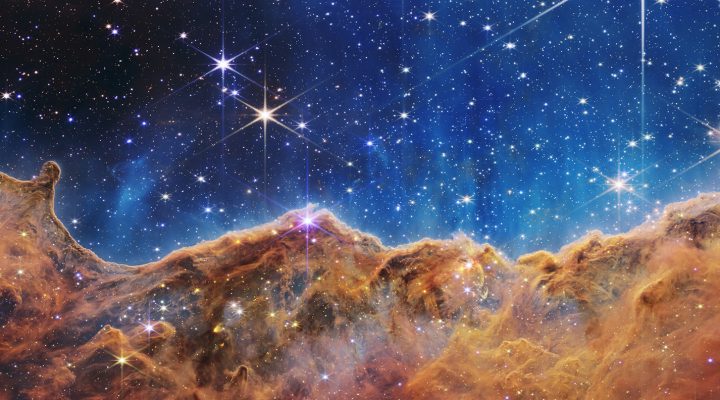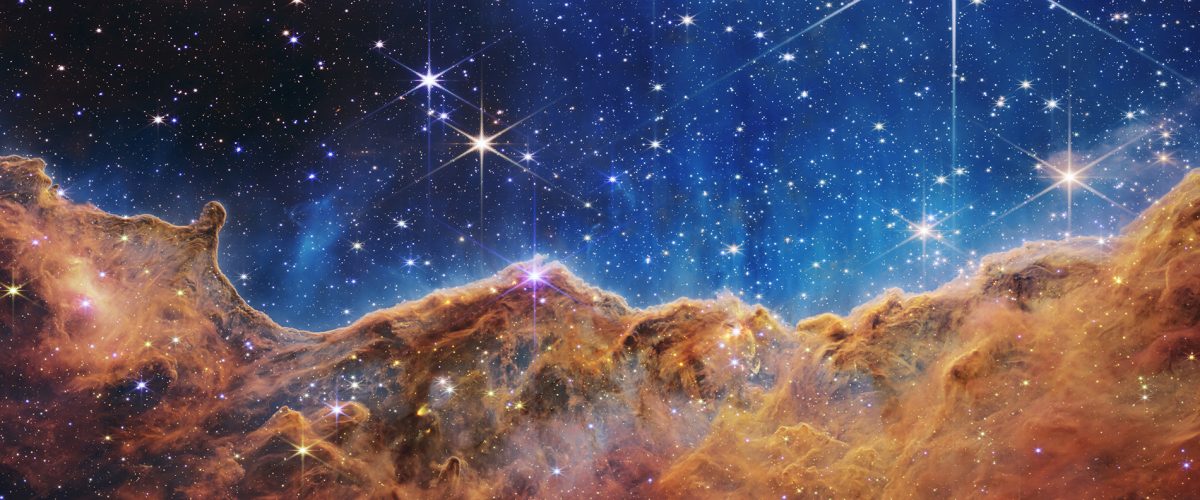A moment more than 13 billion years in the making happened last Tuesday as the James Webb Space Telescope revealed its first five images to the world.
Hailed by NASA as “the dawn of a new era in astronomy,” the images revealed a deep field of galaxies never before seen, an exoplanet containing water in its atmosphere, gas and dust clouds being ejected from two dying stars, the dance of five galaxies and the shockwaves sent out as one of the galaxies collides through, and the radiation and winds caused by the birth of new stars.
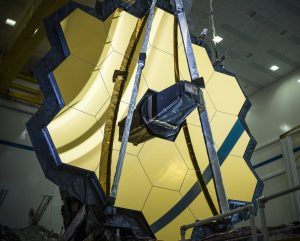
The Webb Space Telescope on display before launch. (Photo courtesy of NASA)
According to the livestream from NASA’s Goddard Space Flight Center in Greenbelt, Md., three questions NASA seeks to explore through Webb are:
- How did the first galaxies form and evolve?
- Are there chemical signatures of the building blocks of life on other worlds?
- Is our solar system unique?
Of course, questions and new discoveries about space always lead to people wondering about human identity in light of what we learn. And as our discoveries grow, Christians tend to wonder about the implications such discoveries might have for theology.
I recently interviewed Paul Wallace, an astrophysicist and Baptist pastor, to better understand the importance of these new space discoveries. But to appreciate what he has to say, first we need to consider how other Christians responded to last week’s stunning space images.
Young earth creationists respond
Christians who are young earth creationists take a literalist reading of Genesis 1, combined with adding up the genealogies listed in the Bible to assume the entire universe is about 6,000 years old. While expressing interest to a degree in NASA’s new findings, they ultimately are skeptical of the James Webb Space Telescope project.
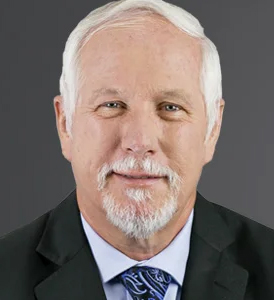
Danny Faulkner
Answers in Genesis, one of the leading purveyors of young earth theology, broadcasted a livestream of their reaction to the NASA images. That Facebook session was hosted by two of their staff members, astronomer Danny Faulkner and “Rocket Rob” Webb, an aerospace engineer.
Although clearly impressed with the technology, neither Faulkner nor Webb were buying the science. Faulkner admitted, “If light travels and always has traveled at a constant rate, then it does seem to present a problem.”
Instead of accepting that scientific fact first articulated in 1850, though, Faulkner suggested another option: “Not only did God miraculously make the heavenly bodies on day four, but he rapidly brought the light to the earth. … We think we’re seeing these things something close to real time. … We don’t really have a well-developed creation model of cosmology. … We just need a paradigm to interpret those things.”
Faulkner, who holds a Ph.D. in astronomy from Indiana University, also questioned whether new stars are still being born, because that would imply an ongoing creation.
“A lot of creationists think not, because God created stars on day four and he stopped creating,” Faulkner explained. “You know he also made horses and dogs on day six, but yet there are horses and dogs being born today. So they’re replacing, I guess, the horses and dogs as they die off. They’re multiplying and they’re being fruitful. Stars are never said to do that, but we do sometimes talk about stars dying. And they will wear out. So is God providing for new stars today? I don’t know.”

“Rocket Rob” Webb
Webb, who previously worked for NASA in satellite navigation, expressed even more opposition to the science behind the images from the Webb telescope. Rather than believing the speed of light never changes, he said the Bible never changes.
“We make sure we’re always looking at the evidence with a biblical worldview, starting with the solid rock, which is God’s word that never changes. Of course, that is always consistent because our God never changes, rather than putting our beliefs and our systems onto the shifting sands of man’s opinion. … We’re a biblical authority ministry. … We’re all about the gospel. We’re all about proclaiming the good news of Jesus Christ and what he did for us guilty sinners.”
Rocket Rob Webb — who has no relation to the name of the telescope — made sure to get out ahead of the Webb telescope launch in January with a “Biblical Response to the JWST Launch” column. There, he said, “Instead of submitting to God, they have turned to the religion of materialistic atheism (and secular humanism) to answer the fundamental questions posed by the JWST program, thus further reducing themselves to absurdity and foolishness.”
As the Answers in Genesis livestream continued, Faulkner played a drinking game where he’d take a sip of Cheerwine every time a NASA scientist mentioned “billions of years” — a meaningless phrase to anyone who believes the earth is only 6,000 years old.
The Gospel Coalition responds
The Gospel Coalition is a conservative evangelical network that takes a less-strident position on the age of the earth and creation — although still generally opposed to teaching evolution.
The group published a column by Chris Martin, a content marketing editor at Moody Publishers, that was quite different than the Answers in Genesis response.

Chris Martin
Martin was far more transparent about what he didn’t know, admitting that his immediate response was, “Nothing matters. Everything matters.”
He explained: “When I look at the images and try to comprehend just how massive our universe is, it feels like my difficult day at work, my upcoming vacation, and my wonderful family simply do not matter. But then, when I consider that by God’s grace we exist and have the ability to taste and see God’s goodness — and witness his glory — here on our speck-of-dust-sized planet in the vastness of the universe, I can’t help but think everything matters.”
He went on to express a feeling conservative evangelicals often are hesitant to admit: “But when I first laid eyes on the SMACS 0723 image, I confess my wonder was mixed with doubt: Could he really be beyond all of this?”
Martin concluded that God is both present and beyond the universe. But his confession of faith gave room for diverse views about the relationship between faith and science.
“Some Christians might be a bit nervous when an image is said to be looking back ’13 billion years’ in time to the universe’s distant past. Debates about creationism and evolution — as well as the age of the universe — will continue within the church. But hopefully we can all be awed and appreciative that the Carina Nebula exists and was created by God.”
BioLogos responds
Deb Haarsma is an astronomer and president of BioLogos, an organization that helps Christians celebrate the discoveries of modern science in a way that deepens their faith in God.

Deb Haarsma
She released a statement saying: “For over three decades, the Hubble Space Telescope has revealed wonders beyond what our ground telescopes could detect. For years, we have anticipated the launch of JWST and how it will extend those discoveries further. And now we can see it!”
She added: “Space is not empty — it is filled with wonders. Psalm 19 begins, ‘The heavens declare the glory of God, the skies proclaim the work of his hands.’ In these pictures, everyone can see that glory. As Christians, we believe that glory points to something more — the galaxies point beyond themselves to their Creator. The universe didn’t arise on its own, or from some impersonal force; the universe was created by a Person. Humanity is not on its own; we are held in the hands of a loving, powerful Creator. When we consider the heavens, the work of God’s fingers, we can proclaim with the psalmist David (Psalm 8): O Lord, our Lord, how majestic is your name in all the universe!”
An astrophysicist and pastor responds
Paul Wallace is an astrophysicist and a pastor who grew up in a Southern Baptist home and eventually found a place within the Cooperative Baptist Fellowship. With a Ph.D. in physics from Duke University and a master of divinity degree from Emory University’s Candler School of Theology, he has spent many years teaching astronomy at the college level as well as serving on the pastoral staff at First Baptist Church of Decatur, Ga.
His unique combination of scientific knowledge and pastoral wisdom gives him a perspective on the science behind the James Webb Space Telescope and its theological implications that Christians across these spectrums should listen to. I recently interviewed him about the telescope.

Paul Wallace
How does the James Webb Space Telescope confirm what we know about the constancy of the speed of light or about the emergence of complexity in the universe over time? How can we know these images aren’t merely real-time images that God miraculously brought the light to us to see?
We do not know what Webb will reveal or confirm. We do not know what theories it will establish or destroy. Science is open-ended and tentative. But it would be foolish to expect it to overturn a theory so well-established as the Big Bang, which states that the universe as we know it began in an extremely hot, dense state about 13.8 billion years ago and has been expanding ever since.
When this idea was first proposed in 1927 (by a Christian cleric), it was the least popular of two or three competing theories about the nature and history of the universe. But ever since, over a span of nearly 100 years, data have again and again supported the Big Bang and have ruled out competing theories. The evidence for the Big Bang is diverse and compelling.
One of the assumptions supporting the Big Bang and, indeed, much of physics, is the constancy of the speed of light. That is, the speed at which light travels (about 186,000 miles per second) has not varied over the 13.8 billion years of cosmic history. But this assumption has been tested over and over in ways that do not depend on the Big Bang theory being correct.
As of today, we have no evidence whatsoever that it is wrong. Moreover, this assumption is fruitful — it leads to self-consistency across and within scientific fields and opens up new and generative lines of inquiry. This fruitfulness is not to be expected of false assumptions.
As to the question of God manipulating light in order to make Webb’s images appear to show a 13.8-billion-year-old universe, I do not even know how to respond to that except to say that God would be a charlatan and a deceiver. That God is not worth anyone’s adoration or even anyone’s time. That God contradicts Scripture in ways that really matter.
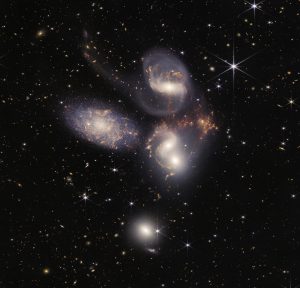
Stephan’s Quintet as seen by the James Webb Space Telescope. (Photo courtesy of NASA)
How might the James Webb Space Telescope lead to new discoveries that could affect how we understand the universe? Do you have any speculations of discoveries it might make, such as life on other planets?
Webb has the capability of determining the composition of planetary atmospheres, and here I mean the atmospheres of exoplanets — planets orbiting stars other than the sun. In fact, it already has detected water in the atmosphere of a planet more than 1,100 light years away. Water, we believe, is a prerequisite for life. And while we do not know what forms life in the universe might take, and what kind of planet it may require, we would love to find an exoplanet with an atmosphere similar to Earth’s.
And, make no mistake, life is what a lot of Webb science is about. Not nearly all of it, but a good fraction of it. It seems doubtful (at least to me) that Webb will confirm the existence of extraterrestrial intelligence, but it has the best chance — of any telescope we’ve ever built — of doing so.
Webb also will help us understand the very early universe: an event called “recombination” in which the universe cooled enough for the first atoms to form; and also the emergence of the earliest galaxies. It also will help us understand galaxy evolution and will reveal, in unprecedented detail, how stars and planetary systems are formed.
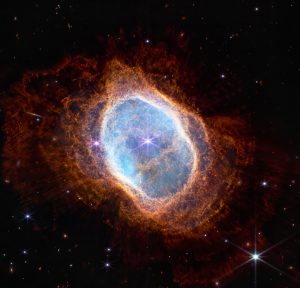
The Southern Ring Nebula in near-infrared light as seen from NASA’s Webb Telescope. This scene was created by a white dwarf star — the remains of a star like our Sun after it shed its outer layers and stopped burning fuel through nuclear fusion. (Photo courtesy of NASA)
Much of Webb’s unique capabilities are due not only to its large mirror (three times the diameter of Hubble’s) but to the fact that, while it detects some orange and red light, it is most sensitive to the infrared. There is more infrared light in the universe than any other wavelength, and much of the gas and dust in the universe is transparent in the infrared, so Webb can see details of galaxy and star formation that are hidden to Hubble, which operates mostly in the visible part of the spectrum.
Despite all of his proclamations of certainty, Danny Faulkner of Answers in Genesis admitted on Tuesday, “We don’t really have a well-developed model of cosmology. We just need a paradigm to interpret those things.” Why do young earth creationists still not have a well-developed model of cosmology? Is that even possible for them ever to have?
So long as their science rests on a surface reading of Genesis 1, young earth creationists will never have a decent model of cosmology. It is simply not possible. One’s model is only as good as one’s assumptions (remember what I wrote about the assumption regarding the speed of light in the first question). Only nonsense grows from nonsense; clarity cannot emerge from falsehood.
Some Christians who aren’t sold out to young earth creationism are admitting they don’t know how to handle the scientific claims of 13 billion years, but say they simply want to be in awe of God. Is that a sufficient response? Or would a full embrace of science increase our wonder in ways that ambiguities about science cannot?
There are some sentimental people who say the less you know about the universe the more wonderful it is. This is wrong, and for two reasons.
“There are some sentimental people who say the less you know about the universe the more wonderful it is. This is wrong.”
First, if we are talking about basic standard-issue scientific knowledge, there is no limit to it. The universe is not a finite, walled-off place, and our science never will exhaust it without remainder. Every new thing we discover opens up new avenues of questioning and discovery. It’s a paradox (and a cliche, but a true one): It is only by learning that we come to know how little we know.
For example, we might ask, “What are the rings of Saturn made of?” And the answer comes, after lots of work: ice. The rings are made of ice. OK, well then, we must ask, “Why ice? Why not rock or frozen CO2 or lost airline luggage?” Well, this follow-up question gets you into the study of comets and gravitational forces and the evolution of the solar system. Questions lead to answers, which lead to questions, which lead to … you get it. This is not a closed system. It bears fruit and won’t stop so long as we keep asking questions.
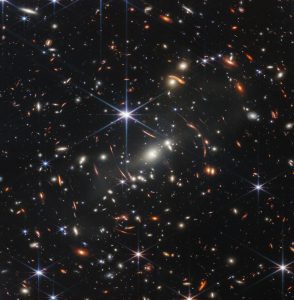
This image from the James Webb Space Telescope offers the deepest and sharpest infrared image of the distant universe ever recorded. Galaxy cluster SMACS 0723, as it appeared 4.6 billion years ago, is teeming with thousands of galaxies, including the faintest objects ever observed in the infrared. Webb’s image is approximately the size of a grain of sand held at arm’s length, a tiny sliver of the vast universe. (Photo courtesy of NASA)
This state of having scientific questions, and of chasing them down only to reveal new questions evokes a state of wonder. It is what I would call first-order wonder. It is simple, discursive not-knowing.
But there is a deeper state of wonder, what I like to call zeroth-order wonder. (Yes, zeroth: there is actually a zeroth law of thermodynamics which was discovered after the first three and which is more fundamental than them, so they called it zeroth.)
Zeroth-order wonder is the wonder of our very existence, of our having shown up on a small green and blue planet, surrounded by stars and dying stars, without being asked or warned, of finding ourselves suddenly in the world. And I assure you this wonder is multiplied many, many times by scientific knowledge. This wonder is never solved; it cannot be solved. “Solved” just doesn’t apply. But it can be deepened in many ways: art, music, religious practice, grief, joy and, yes, science.
So to be frank, I don’t have too much patience with people who insist on not learning as a way to protect their feelings of wonder.
You’ve said in the past that you tend to respond to young earth creationists with pastoral questions rather than with scientific explanations. Do you still feel this way? And if so, what pastoral questions or encouragements would you share with them as scientific consensus continues to be confirmed or developed? What would you share as a pastor with Christians who aren’t sold out to young earth creationism, but who feel afraid of embracing modern science?
Yes, it is not possible to argue with a well-prepared creationist. Creationism is a species of conspiracy theory, and every argument against such a theory is only turned into further evidence by the creationist. I do not mean I have no responsibility to learn what I can about the universe and to marshal all the evidence I can when I engage with a creationist. I only mean that changing their mind cannot be the one overriding goal; if instead you turn the encounter into an opportunity to get to know this person, to know what moves them, to discover what keeps them awake at night, to learn their story, then, in the course of talking about this topic you may actually do the work of what Jesus called the kingdom of God. You have made a friend, at least.
“Creationism is a species of conspiracy theory, and every argument against such a theory is only turned into further evidence by the creationist.”
Of course, if the creationist is combative and insincere then there’s nothing at all to talk about. In that situation, I just try to bring the conversation to an end as quickly as possible. Science and its vision of the universe do not stand or fall on my ability or inability to prove anything to anyone. In this way it is similar to the gospel.
To those Christians who are afraid to embrace science, I remind them we are commanded, not asked, by Jesus to love God with all our mind. To remain true to the world God so loves. To not evade or run from knowledge. There is such a thing as the intellectual love of God. And, finally, to quote Galileo, “I do not feel obliged to believe that the same God who has endowed us with senses, reason and intellect has intended us to forego their use.”
Rick Pidcock is a 2004 graduate of Bob Jones University, with a bachelor of arts degree in Bible. He’s a freelance writer based in South Carolina and a former Clemons Fellow with BNG. He recently completed a master of arts degree in worship from Northern Seminary. He is a stay-at-home father of five children and produces music under the artist name Provoke Wonder. Follow his blog at www.rickpidcock.com.
Related articles:
Creationism is big business in Northern Kentucky
Were there baby dinosaurs on Noah’s Ark, and how does that relate to COVID?
E.Y. Mullins, the piano mouse, the Cowardly Lion, and the monkey trial | Analysis by Brad Bull

